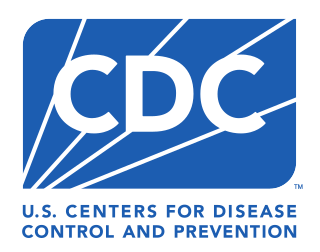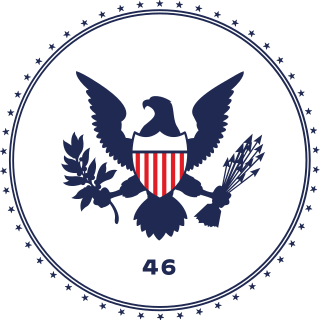
The Centers for Disease Control and Prevention (CDC) is the national public health agency of the United States. It is a United States federal agency under the Department of Health and Human Services, and is headquartered in Atlanta, Georgia.

The Biomedical Advanced Research and Development Authority (BARDA) is a U.S. Department of Health and Human Services (HHS) office responsible for the procurement and development of medical countermeasures, principally against bioterrorism, including chemical, biological, radiological and nuclear (CBRN) threats, as well as pandemic influenza and emerging diseases. BARDA was established in 2006 through the Pandemic and All-Hazards Preparedness Act (PAHPA) and reports to the Office of the Assistant Secretary for Preparedness and Response (ASPR). The office manages Project BioShield, which funds the research, development and stockpiling of vaccines and treatments that the government could use during public health emergencies such as chemical, biological, radiological or nuclear (CBRN) attacks.
An Emergency Use Authorization (EUA) in the United States is an authorization granted to the Food and Drug Administration (FDA) under sections of the Federal Food, Drug, and Cosmetic Act as added to and amended by various Acts of Congress, including by the Pandemic and All-Hazards Preparedness Reauthorization Act of 2013 (PAHPRA), as codified by 21 U.S.C. § 360bbb-3, to allow the use of a drug prior to approval. It does not constitute approval of the drug in the full statutory meaning of the term, but instead authorizes the FDA to facilitate availability of an unapproved product, or an unapproved use of an approved product, during a declared state of emergency from one of several agencies or of a "material threat" by the Secretary of Homeland Security.

The White House Initiative on Asian Americans, Native Hawaiians, and Pacific Islanders (WHIAANHPI) is a United States governmental office that coordinates an ambitious whole-of-government approach to advance equity, justice, and opportunity for Asian Americans, Native Hawaiians, and Pacific Islanders. The Initiative collaborates with the Deputy Assistant to the President and AA and NHPI Senior Liaison, White House Office of Public Engagement and designated federal departments and agencies to advance equity, justice, and opportunity for AA and NHPIs in the areas of economic development, education, health and human services, housing, environment, arts, agriculture, labor and employment, transportation, justice, veterans affairs, and community development.

On December 31, 2019, China announced the discovery of a cluster of pneumonia cases in Wuhan. The first American case was reported on January 20, and Health and Human Services Secretary Alex Azar declared a public health emergency on January 31. Restrictions were placed on flights arriving from China, but the initial U.S. response to the pandemic was otherwise slow in terms of preparing the healthcare system, stopping other travel, and testing. The first known American deaths occurred in February and in late February President Donald Trump proposed allocating $2.5 billion to fight the outbreak. Instead, Congress approved $8.3 billion with only Senator Rand Paul and two House representatives voting against, and Trump signed the bill, the Coronavirus Preparedness and Response Supplemental Appropriations Act, 2020, on March 6. Trump declared a national emergency on March 13. The government also purchased large quantities of medical equipment, invoking the Defense Production Act of 1950 to assist. By mid-April, disaster declarations were made by all states and territories as they all had increasing cases. A second wave of infections began in June, following relaxed restrictions in several states, leading to daily cases surpassing 60,000. By mid-October, a third surge of cases began; there were over 200,000 new daily cases during parts of December 2020 and January 2021.

The federal government of the United States initially responded to the COVID-19 pandemic in the country with various declarations of emergency, some of which led to travel and entry restrictions and the formation of the White House Coronavirus Task Force. As the pandemic progressed in the U.S. and globally, the U.S. government began issuing recommendations regarding the response by state and local governments, as well as social distancing measures and workplace hazard controls. State governments played a primary role in adopting policies to address the pandemic. Following the closure of most businesses throughout a number of U.S. states, President Donald Trump announced the mobilization of the National Guard in the most affected areas.
Schedule Policy/Career, commonly known by its former name Schedule F, is a job classification for appointments in the excepted service of the United States federal civil service for permanent policy-related positions. The purpose of the provision is to increase the president's control over the federal career civil service by removing their civil service protections and making them easy to dismiss, which proponents stated would increase flexibility and accountability to elected officials. It was widely criticized as providing means to retaliate against federal officials for political reasons, impede the effective functioning of government, and providing risk to democracy. It has been estimated that tens or hundreds of thousands of career employees could be reclassified, increasing the number of political appointments by a factor of ten.

The COVID-19 Advisory Board was announced in November 2020 by President-elect of the United States Joe Biden as part of his presidential transition. It was co-chaired by physicians David A. Kessler, Marcella Nunez-Smith, and Vivek Murthy and comprises 13 health experts. The board was then succeeded by the White House COVID-19 Response Team upon Biden's presidency in January 2021.

Executive Order 13991, officially titled Protecting the Federal Workforce and Requiring Mask-Wearing, is an executive order signed by U.S. President Joe Biden on January 20, 2021. The order commands federal agencies and properties to require that mitigations to help reduce the spread of Coronavirus disease 2019 (COVID-19), as recommended by the Centers for Disease Control and Prevention (CDC), be employed and enforced by the employees and visitors of federal land and properties, including social distancing and the wearing of face masks.
The social policy of the Joe Biden administration is intended to improve racial equity, increase access to safe and legal abortions, tighten restrictions on gun sales, among other aims. A number of policies aim to reverse the former policies of President Donald Trump, including the "Muslim" travel ban and loosened anti-discriminatory policies relating to LGBT people.

Executive Order 13990, officially titled Protecting Public Health and the Environment and Restoring Science to Tackle the Climate Crisis is an executive order signed by President Joe Biden on January 20, 2021, which implements various environmental policies of his administration including revoking the permit for the Keystone XL Pipeline and temporarily prohibiting drilling in the arctic refuge. It was rescinded by Donald Trump within hours of his assuming office on January 20, 2025.

The United States' response to the COVID-19 pandemic with consists of various measures by the medical community; the federal, state, and local governments; the military; and the private sector. The public response has been highly polarized, with partisan divides being observed and a number of concurrent protests and unrest complicating the response.
The government of Texas's initial response to the COVID-19 pandemic in the state consisted of a decentralized system that was mostly reliant on local policies. As the pandemic progressed in Texas and throughout the rest of the country, the Texas government closed down several businesses and parks, and it eventually imposed a statewide stay-at-home order in late May. Then, between May and June 2020, the state government initiated a phased reopening, which was viewed as controversial. The reopening was phased back in June and July 2020 following a new surge of COVID-19 cases in the state. In March 2021, as COVID-19 vaccines began to be administered throughout the U.S., the Texas government reopened the state again.
Executive Order 13987, officially titled Organizing and Mobilizing the United States Government to Provide a Unified and Effective Response to Combat COVID-19 and to Provide United States Leadership on Global Health and Security, is the third executive order signed by U.S. President Joe Biden on January 20, 2021. The order indicates that the federal government will respond to the COVID-19 Pandemic in a more coordinated manner and that federal rules will be published in the near future. It was rescinded by Donald Trump within hours of his assuming office on January 20, 2025.
Executive Order 13994, officially titled Ensuring a Data-Driven Response to COVID-19 and Future High-Consequence Public Health Threats, is the tenth executive order signed by U.S. President Joe Biden. The order indicates that it is vital to ensure that there is a more analytical approach to dealing with COVID-19 public health threats.
Executive Order 13995, officially titled Ensuring an Equitable Pandemic Response and Recovery, was signed on January 21, 2021, and was the eleventh executive order signed by U.S. President Joe Biden. The order works to guarantee a fair response and recovery from the COVID-19 pandemic. It was rescinded by Donald Trump within hours of his assuming office on January 20, 2025.
Executive Order 13997, officially titled Improving and Expanding Access to Care and Treatments for COVID-19, was signed on January 21, 2021, and was the thirteenth executive order signed by U.S. President Joe Biden. The order worked to ameliorate and increase access to COVID-19 care and treatment. It was rescinded by Donald Trump within hours of his assuming office on January 20, 2025.

Over the course of the COVID-19 pandemic, COVID-19 vaccine mandates have been enacted by numerous states and municipalities in the United States, and also by private entities. In September 2021, President Joe Biden announced that the federal government would take steps to mandate COVID-19 vaccination for certain entities under the authority of the federal government or federal agencies. Most federal mandates thus imposed were either overturned through litigation, or withdrawn by the administration, although a mandate on health care workers in institutions receiving Medicare and Medicaid funds was upheld. All federal mandates were lifted when the national emergency was declared to have ended in May 2023. A small number of states have gone in the opposite direction, through executive orders or legislation designed to limit vaccination mandates.
The Biden administration COVID-19 action plan, also called the Path out of the Pandemic, is a substantial increase in the use of vaccination mandates as part of the U.S. federal government response to the COVID-19 pandemic announced by President Joe Biden on September 9, 2021, to be carried out by officials in the Biden administration. The plan included various announced prospective efforts, as well as the issuance of several executive orders.








